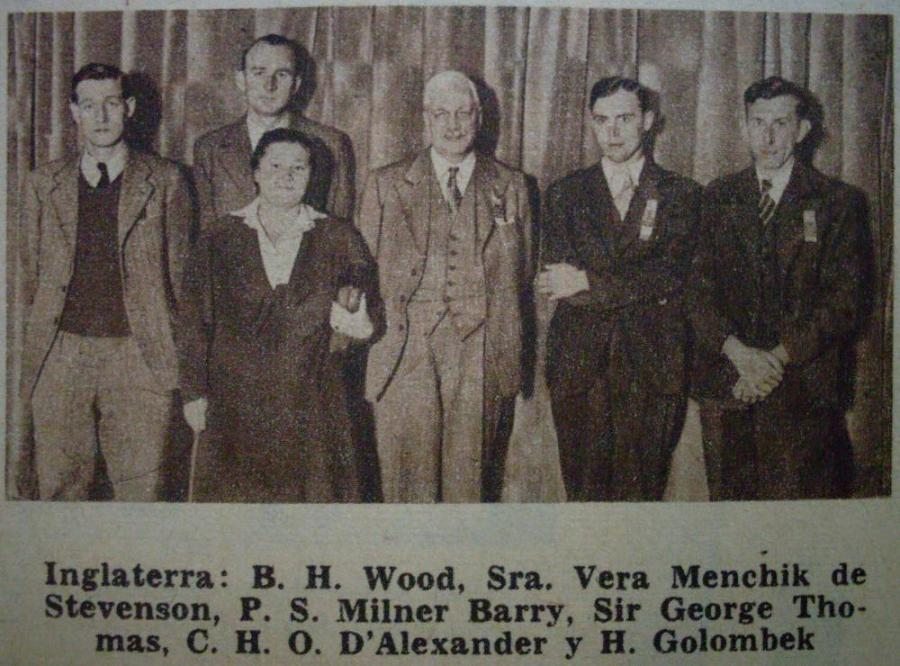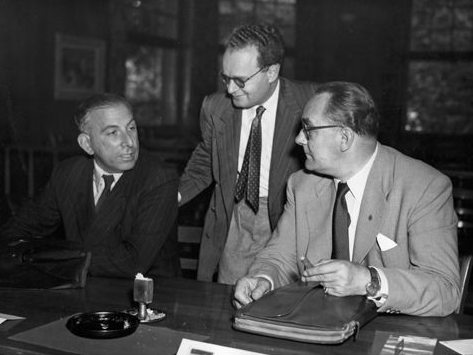.jpeg)

.jpeg)
ChessBase 17 - Mega package - Edition 2024
It is the program of choice for anyone who loves the game and wants to know more about it. Start your personal success story with ChessBase and enjoy the game even more.
Harry Golombek was born on March 1st, 1911, in Lambeth in London's East End into a family of Polish-Jewish immigrants.
Golombek learnt to play chess when he was still in school, and in 1928 he first played in the London Scholastic Chess Championships for Wilson's Grammar School. One year later, in 1929, he won these Championships in his age group and another year later he won the top class of these championships.
After finishing school Golombek started to study languages at King's College in London but it remains unclear whether he ever finished his studies. However, Golombek definitively had a gift for languages and it is said that he knew the word for "ice cream" in 13 languages. In some of these languages he will also have known a few more words.
In 1931 Golombek played in the main group of the British Championship and finished in the middle of the field of twelve players. Vera Menchik won the tournament and she also won her game against Golombek.
In the following years he was a regular in the master's group of the British Championship. 1932 he finished at the bottom of the table, 1933 and 1934 he finished in the middle (both Championships were won by Mir Sultan Khan), but in 1935 Golombek shared third to fifth place. In the following championships before the war Golombek was always one of the top players though he never managed to win the title. Apart from the British Championships he also played in a number of individual tournaments before the war, mainly in England.
A World Champion's Repertoire against the Queen's Gambit Declined
This DVD offers a complete repertoire for handling this solid opening, often featuring a dynamic approach to pose the opponent more practical problems. Both of the main continuations 3...Nf6 and 3...Be7 are covered in two separate parts.
In 1935, in Warsaw, Golombek played his first Olympiad for the English national team, finishing 12th alongside William Winter, George Alan Thomas, Conel Hugh Alexander and Henry Ernst Atkins. From 1935 to 1962 Golombek played in no less than nine Olympiads for England.
Golombek was also part of the English team at the Olympiad in Buenos Aires 1939 that was interrupted by the outbreak of World War II on September 1st, 1939, when German troops invaded Poland.

The English team departed immediately from Buenos Aires though most of the other teams decided to stay until the end of the Olympiad. After the Olympiad a lot of the participants did not want to return to war-torn Europe and remained in Argentina, and many of them never returned to their home countries.
But Golombek found his way home and together with other English chess players he was recruited by the Government Code and Cipher School as a codebreaker to help decipher the coded messages of the German armies during World War II.
After the war, C. H. O. D. Alexander, Golombek's teammate in Buenos Aires made a career at the MI5, the British Security Service, and became head of GCHQ, the Government Communications Headquarters, formerly the Government Code and Cipher School, but Golombek returned to his life as a civilian. He also returned to tournament chess and in 1946 he played in the Karel Treybal Memorial in Prague and finished in the upper half of the field.
The picture below shows him together with the other participants of the British Championship 1946.

Back (from left to right): Gabriel Wood, Reginald Broadbent, Philip Milner-Barry, Andrew RB Thomas, Baruch H Wood. Front (from left to right): Bob Wade, Frank Parr, William Winter, Robert Combe, Hugh Alexander, Harry Golombek, Gerald Abrahams. | Foto: BritBase
In 1947 Golombek won the British Championship, a feat he repeated in 1949 and 1955, and until 1968 Golombek continued to play regularly in the British Championships. In 1950 the FIDE awarded him the title of an International Master and in 1995 the FIDE made him an Honorary Grandmaster.
Marin's English Love Vol.1 and 2 - A complete repertoire for White after 1.c4
The aim of these Dvd's is to build a repertoire after 1.c4 and 2.g3 for White. The first DVD includes the systems 1...e5, the Dutch and Indian setups. The second DVD includes the systems with 1...c5, 1...c6 and 1...e6.
From 1938 to 1940 Golombek worked as editor of the British Chess Magazine and in 1945 he followed Stuart Millner-Barry by taking over the chess column of The Times — which he would write for more than 40 years, until 1989. From 1955 to 1979 Golombek also wrote the weekly chess column for the Observer. As a correspondent for The Times he followed many tournaments and important matches directly, e.g. the tense World Championship match between Karpov and Kortschnoi in Baguio City 1978. One day he entered the pressroom during the game, mumbling: "Now he blundered. That's it for Kortschnoi." All the journalists were in a hurry to watch the game directly and hastened to leave the pressroom. Only Golombek stayed, brewed a tea for himself, while commenting drily: "This is the only way to have a cup of tea in quiet here."
Apart from his career as an active player which he pursued until the early 70s Golombek was also a prolific author: he wrote more than 30 chess books, textbooks, tournament books, and monographs. Moreover, as an International Arbiter he directed numerous tournaments and matches, including matches for the World Championship. In fact, Golombek was one of the arbiters at the famous Candidates Tournament in Zurich 1953, and he was also the arbiter of the tense Candidates Match between Tigran Petrosian and Robert Hübner 1971 which Hübner forfeited while one point down because he felt disturbed by noise. However, Hübner does not have fond memories of this match nor of Golombek's role as an arbiter in the match.

Harry Golombek (left) | Photo: SG Zürich
For his achievements during the war, the British government awarded Golombek the Order of the British Empire (OBE).
The last years of his life Golombek lived in a suburb in north-west London, in 35 Albion Cres, Chalfont Saint Giles.
Golombek died 25 years ago, on January 7th, 1995.
Translation from German: Johannes Fischer